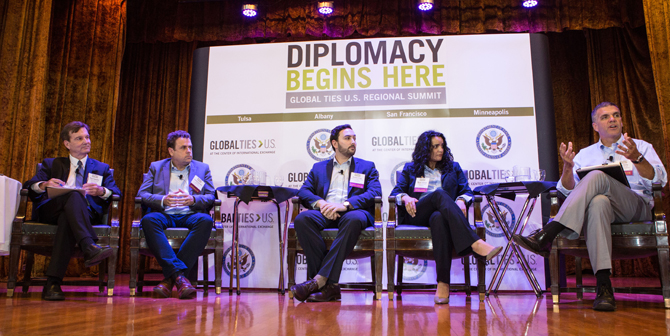By Jason Terry, Associate Director, Exchanges and Professional Development

Photo courtesy of Jaime Soja.
For over 75 years, members of the Global Ties family have been building diplomatic relationships at their dinner tables, in their offices, and at baseball parks. For the second year in a row, we celebrated the diverse impacts of international exchange programs in U.S. communities in our Diplomacy Begins Here regional summits.
We started this year in Tulsa, Oklahoma, where we explored the future of citizen diplomacy with Tulsa Global Alliance and Global Ties Arkansas. Renowned author and activist Clifton Taulbert reminded us that diplomacy requires “starting where we are,” a fitting challenge for us to absorb the reality that no matter how large the challenge ahead seems, we must act with what we have in front of us. Continuing onto Albany, New York, we examined the role of empowered women in advancing global development with the International Center of the Capital Region, Rochester Global Connections, and the World Affairs Council of Western Massachusetts. Lieutenant Governor Kathleen Hochul encouraged our audience, especially the women present, to “go into the world and do well… but more importantly, do good.”
In Minneapolis, a collaboration with the local Somali-American population led to an enriching discussion of peacebuilding approaches to countering extremism. The Global Minnesota hosted summit brought leaders ranging from U.S. Senator Amy Klobuchar to “Average Mohamed” Mohamed Amin Ahmed explored the role we all have to play in advancing understanding over violence. We wrapped up our year in Northern California, examining innovation in water, energy, and agriculture on a global scale with the Northern California World Trade Center and Global Ties San Francisco. In particular, Arun Kumar, Director-General of the U.S. Foreign Commercial Service, noted the need for small and medium-sized enterprises across the United States to expand their global fluency in order to stay competitive in a dynamic marketplace.
Across four summits, our host partners engaged 748 people from nearly 300 organizations, encouraging them to think about how they embody the concept of #IAmDiplomacy. We were delighted to be joined by five members of Congress, alongside state and local elected officials. As more and more Americans embrace the reality that we do not live in a vacuum surrounded by two oceans, the conversations our Diplomacy Begins Here inspire become more and more critical.
Though each summit focused squarely on the future, a highlight for me was visiting the Fulbright Archive in Fayetteville, Arkansas following the Tulsa summit. I was privileged to hold in my hand the notes that Senator J. William Fulbright read from as he introduced legislation in 1946 that would be expanded into the Fulbright-Hays Act nearly 20 years later. Fulbright’s ingenious idea was to use funds from the sale of surplus World War II military supplies to fund U.S. Department of State exchange programs. Sen. Fulbright said that the exchange of people “between countries can play a major role in helping to break down mutual misunderstandings and in furthering the kind of knowledge that leads to mutual confidence…. The necessity for increasing our understanding of others and their understanding of us has a meaning that it has never had in the past.”
Now more than ever, a “whole of America” approach must be embraced to further positive international relations. Diplomacy Begins Here, and indeed the work we all do every day to build global ties, remain essential to advancing Sen. Fulbright’s prescient mission.
